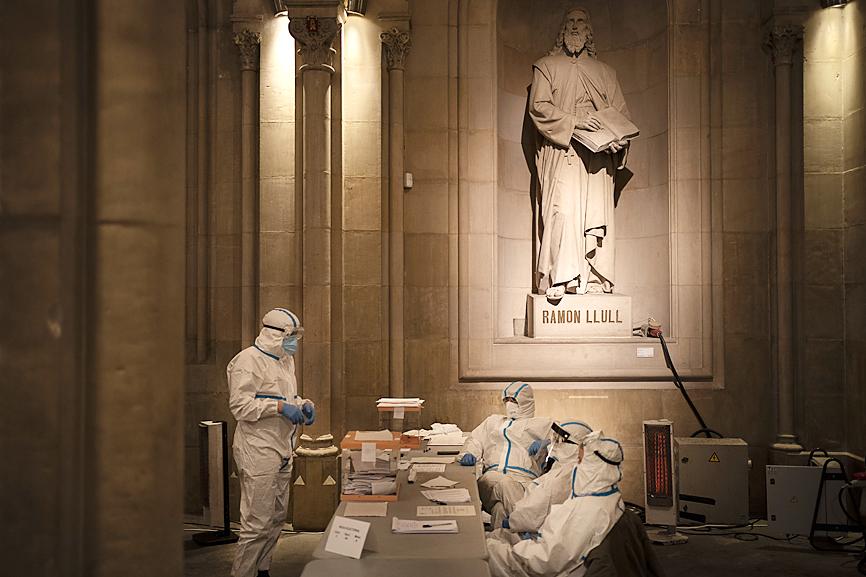Catalan separatist parties on Sunday boosted their parliamentary majority in a regional election that was overshadowed by the COVID-19 pandemic and marked by low turnout, more than three years after a failed bid to break away from Spain.
With Spain still grappling with a third wave of coronavirus infections, the vote in the wealthy northeastern region was held under tight restrictions to reduce the risk of contagion.
With 99 percent of the votes counted, Spanish Prime Minister Pedro Sanchez’s Socialists won the most votes, but the three separatist parties together were set to get 74 seats in the 135-seat assembly.

Photo: AP
That is up from 70 seats won in the previous election in December 2017, just months after Catalonia’s failed secession bid, which led to the jailing of several separatist leaders.
To reduce the risk of virus transmission in the region, polling stations were set up in spacious venues like food markets, the area around FC Barcelona’s soccer stadium and the bullring in Tarragona.
Voters had to wear masks, use disinfectant gel provided at polling stations and stand apart while lining up in rainy weather to cast their ballots.
During the last hour of voting, which was reserved for people infected with COVID-19, polling station workers wore gloves, facial screens and white protective gowns.
The Socialists had 33 seats, up from 17 in the previous vote when they finished fourth.
Sanchez had hoped the election — Catalonia’s fifth in a decade — would end separatist rule in the region, which accounts for one-fifth of Spain’s economy.
He fielded the Spanish Minister of Health Salvador Illa as his candidate in the hope that his high profile in the fight against the pandemic would help win votes.
While separatist parties have been deeply divided over strategy since the failed secession bid, they were not punished by voters and for the first time won more than 50 percent of the vote, against 47.5 percent four years ago.
The more moderate ERC got 33 seats, the hardline JxC got 32 and the radical CUP nine seats.
The result leaves the ERC’s main candidate, 38-year-old jurist Pere Aragones, best placed to become Catalonia’s next leader.
“We have stopped an operation by the [Spanish] state to expel separatists from institutions,” he said after the results were announced.
Illa had said it was “time to turn the page” after more than a decade of Catalan nationalist governments focusing on separatism, but Aragones dismissed his approach during the campaign as “amnesia.”
He has said his party would not turn the page while independence leaders remained in jail over the failed secession bid.
Catalonia is governed by a coalition led by JxC, which is prone to confrontation with Madrid, and the ERC, which is open to dialogue and has helped Sanchez’s minority government pass laws at the national level.
The anti-coronavirus measures appeared to discourage people from voting.
While about 5.5 million people were eligible to vote, turnout was a record low at 54.4 percent, down from almost 80 percent in the previous election.
“I hesitated until the last minute whether to come vote or not,” Cristina Caballero, a 34-year-old child educator, told reporters at a Barcelona polling station. “I think these elections should have been postponed.”
Some people picked for polling station duty also expressed concern.
“Of course we are afraid, I just had cancer and am still on sick leave, but I was called up,” Eva Vizcaino, a 54-year-old office worker, told reporters at a Barcelona polling station.

ANGER: Unrest worsened after a taxi driver was killed by a police vehicle on Thursday, as protesters set alight government buildings across the nation Protests worsened overnight across major cities of Indonesia, far beyond the capital, Jakarta, as demonstrators defied Indonesian President Prabowo Subianto’s call for calm. The most serious unrest was seen in the eastern city of Makassar, while protests also unfolded in Bandung, Surabaya, Solo and Yogyakarta. By yesterday morning, crowds had dispersed in Jakarta. Troops patrolled the streets with tactical vehicles and helped civilians clear trash, although smoke was still rising in various protest sites. Three people died and five were injured in Makassar when protesters set fire to the regional parliament building during a plenary session on Friday evening, according to

Australia has announced an agreement with the tiny Pacific nation Nauru enabling it to send hundreds of immigrants to the barren island. The deal affects more than 220 immigrants in Australia, including some convicted of serious crimes. Australian Minister of Home Affairs Tony Burke signed the memorandum of understanding on a visit to Nauru, the government said in a statement on Friday. “It contains undertakings for the proper treatment and long-term residence of people who have no legal right to stay in Australia, to be received in Nauru,” it said. “Australia will provide funding to underpin this arrangement and support Nauru’s long-term economic

‘NEO-NAZIS’: A minister described the rally as ‘spreading hate’ and ‘dividing our communities,’ adding that it had been organized and promoted by far-right groups Thousands of Australians joined anti-immigration rallies across the country yesterday that the center-left government condemned, saying they sought to spread hate and were linked to neo-Nazis. “March for Australia” rallies against immigration were held in Sydney, and other state capitals and regional centers, according to the group’s Web site. “Mass migration has torn at the bonds that held our communities together,” the Web site said. The group posted on X on Saturday that the rallies aimed to do “what the mainstream politicians never have the courage to do: demand an end to mass immigration.” The group also said it was concerned about culture,

CRACKDOWN: The Indonesian president vowed to clamp down on ‘treason and terrorism,’ while acceding to some protest demands to revoke lawmaker benefits Protests in Indonesia over rising living costs and inequality intensified overnight, prompting Indonesian President Prabowo Subianto to cancel a planned trip to China, while demonstrators reportedly targeted the homes of the finance minister and several lawmakers. Rioters entered Indonesian Minister of Finance Sri Mulyani Indrawati’s residence near Jakarta early yesterday, but were repelled by armed forces personnel, Kompas reported. Items were taken from the homes of lawmaker Ahmad Sahroni and two others, according to Detik.com. The reports of looting could not be independently verified, and the finance ministry has not responded to requests for comment. The protests were sparked by outrage over